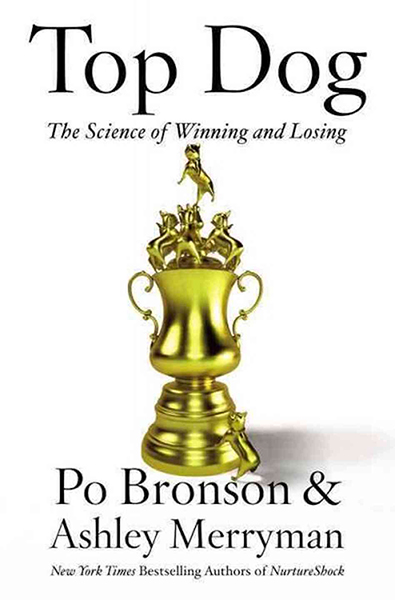BJ Epstein casts a critical eye over the latest popular science book from Po Bronson and Ashley Merryman in her review of Top Dog : The Science of Winning and Losing.
Does testosterone actually make us more aggressive? Can worrying help us? Why is competition beneficial? Do men and women look at the odds and opportunities differently? How can a bright, hard-working student do badly in an exam, while a student who doesn’t do that well in class excels on tests? Why is it not always a good idea to put people of similar ability together in groups?

by Po Bronson and Ashley Merryman
335 pp., New York: Hachette, 2013
These are just a few of the questions that Po Bronson and Ashley Merryman explore in their new popular science book, Top Dog: The Science of Winning and Losing. We often think of competition as a negative thing, assuming that competitive people only care about winning and beating others and that we ought to boost everyone’s self-esteem through evening out the playing field and offering praise, but as Bronson and Merryman show, being motivated and wanting to compete is in many cases a helpful adaptation that allows humans to innovate and be creative. We need to take risks to discover new solutions to everyday problems, and we can’t do that without competing. Bronson and Merryman use research from psychology and biology, along with other fields, to back up their ideas, and they do so in a very readable way.
Among other things, you’ll find that, although sexism is still a problem when it comes to women getting chosen for positions or promoted, another part of the problem is that women simply don’t apply or put themselves forward for a post unless they are quite sure that they have fairly good odds of getting it. ‘When women are confident they have a chance, they will compete. As much or more than men. They just refuse to waste time with losing.’ Intriguingly, this leads on to a discussion about how different types of educational systems suit the different genders: girls thrive in elite, competitive schools, whereas boys can find such places discouraging. Girls appear to like having a good student in class to look up to and be inspired by, while boys don’t. In fact, boys would be better off at easier schools with fewer star students. Such research suggests that we might need to rethink our school system, potentially developing two different single-sex environments that motivates boys and girls appropriately.
Another topic Merryman and Bronson look at is our hormonal make-up. Testosterone helps us to think more analytically and rationally, but the problem is that it also makes us more argumentative so our ‘sense of right and wrong intensifies into fury’. Meanwhile, cortisol, you might be surprised to learn, doesn’t cause stress, as it is often erroneously thought; rather, it seems to help people deal with stress, and it ‘defuses the competitive desire … helps you put it in the past and move on’. This makes me wonder whether perpetually stressed-out people will soon be offered cortisol supplements by their doctors.
The authors distinguish between two types of people: Warriors are those who are ‘ready for threatening environments where maximum performance is required despite threat and pain’ while Worriers are ‘capable of more complex planning and thinking about likelihoods and consequences’. For those of us who worry a lot, it’s helpful to know that ‘Worriers can handle stress, and even outperform the Warriors, if they train themselves to handle the specific stress of certain recurring situations. By acclimating to their stressful environment over a long period of time, they learn to perform.’
Bronson and Merryman previously published Nurtureshock: Why Everything We Thought About Raising Children Is Wrong, and as with Top Dog, that book wove together scientific research, interesting and apposite anecdotes, and good writing in order to tell a fascinating story. I’m eager to see what they publish next. If they have the motivation, that is!
Top Dog










